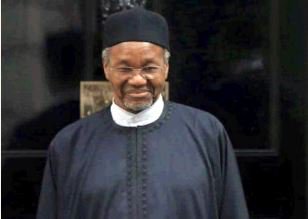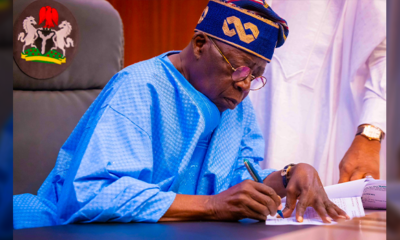Latest News
Mamman Daura: The story of Nigeria’s de facto president who rules from the glass house (Opinion)

By Farooq Kperogi
A few days before it became grist for Nigeria’s overactive social media rumor mills, a retired general and contemporary of Muhammadu Buhari’s told me, in the course of a 30-minute phone conversation, that Mamman Daura, Buhari’s nephew who is nonetheless older than him by three years, had made up his mind to “get at” Aisha Buhari by arranging a quiet marriage between Humanitarian Affairs Minister Sadiya Umar Farouq and Muhammadu Buhari.
He mentioned this as an aside and seemed to expect me to be curious enough about what he had told me to ask further questions. But I didn’t. That appeared to have shocked him, so he asked why I wasn’t piqued by what he had told me. I said it was because it frankly didn’t interest me what Buhari did in his private space.
I am by no means claiming any moral high grounds here. I think it’s legitimate to be curious about the private lives of public officials whose decisions have consequences for millions of people, but that’s not my own inclination. I care about the private affairs of public officials only if their private affairs impinge on public policy.
That was why, in spite of pressures from friends and social media followers, I kept a studied silence on the social media frenzy over this issue. As I told the general, it means nothing to me that “Buhari has been dating Sadiya since CPC [Congress for Progressive Change] days”; that’s his private business, which, in my opinion, we should be decent enough to respect.
I’m more worried, I told him, by the fact that Sadiya Umar Farouq is minister of Humanitarian Affairs, Disaster Management & Social Development even when, according to a two-year-old Daily Nigerian investigation titled “INVESTIGATION: Unmasking the real #Dabinogate beneficiaries,” she allegedly diverted and misappropriated 200 tonnes of date palms (dabino) famously donated to internally displaced persons in the northeast by the Saudi Arabian government in 2017.
She was Federal Commissioner in charge of the National Commission for Refugees, Migrants and Internally Displaced Persons at the time. According to the Daily Nigerian, she “diverted [the 200 tonnes of date palms] to Zamfara State and kept [them] in a warehouse, while the rest was distributed to traditional rulers.”
To steal from humanitarian donations to poor, vulnerable internally displaced people is the vilest, most ignoble, least defensible form of villainy there can ever be. But Buhari has rewarded her eye-wateringly larcenous treachery with an appointment as minister of—of all ministries— Humanitarian Affairs, Disaster Management & Social Development, a previously non-existent ministry!
Why would anyone create a ministry of “humanitarian affairs” and “disaster management” for a person who has a history of insensate cruelty toward people who are victims of disasters and who desperately need but have lacked humanitarian assistance? It’s like appointing a wolf to keep guard over sheep.
Curiously, Nigerians are more interested in her history of alleged romantic entanglements with Buhari (which should be no one’s business) than the fact of her heading a ministry which her past eminently disqualifies her for.
Anyway, why have I chosen to comment on the embarrassing public fight by Buhari’s obviously dysfunctional family even when I initially had no interest in it? Well, it’s because the way Buhari manages— or, more appropriately, mismanages—his immediate family provides insightful clues to how he “ungoverns” Nigeria.
Buhari is a feeble, indecisive, infirm, emotionally dependent person for whom the idea of taking responsibility is alien. People who know him intimately have told me that his psychological and emotional makeup is unsuited for leadership. He is not only a loner; he always relies on others to take decisions for him.
People close to him have told me long before now that Buhari has an innately and enduringly infantile craving for a paternal dictatorship. I don’t know if this has anything to do with the fact that he lost his father at an early age and didn’t quite experience sustained paternal guidance. But Mamman Daura has been Buhari’s emotional and intellectual fortress and his father figure, although they are only about three years apart in age. Daura makes momentous decisions for Buhari and rules on his behalf through Abba Kyari, his protégé.
Mamman Daura is the first son of Buhari’s oldest half-brother from a different mother. That makes Buhari his uncle, and him Buhari’s nephew. Many people, particularly from the South, have a hard time wrapping their heads around this. Well, I have a similar situation. My late father married a younger woman and had his last child when he was 80, so my first daughter is older than my youngest half-brother. My daughter still struggles to call him her uncle.
This is important because Mamman Daura and his sidekick Abba Kyari are the power behind the throne. They constitute the nucleus of the ill-famed Aso Rock cabal that acts as Buhari’s puppeteers. In my October 22, 2016 column titled “Aisha Buhari and the Evil Aso Rock Cabal,” I pointed out that “Buhari is held hostage by an evil, sneaky, corrupt, vulturous, and conniving cabal that ensures that his wife doesn’t see him even in the ‘kitchen,’ the ‘living room,’ or ‘the other room.’
“The BBC interview was Aisha’s vigorous ventilation of pent-up anguish against a cold, calculating, and corrupt cabal that has made Buhari a stranger to his own wife.” It’s the fifth most widely read article of all time on my blog because although it was cryptic, many people, particularly in the North, knew what I was talking about. I was told that the cabal actually met to discuss who divulged this information to me.
It’s supremely emblematic that Mamman Daura (along with his entire family) lives in a wing of the Presidential Villa called the “Glass House,” according to his spoilt, entitled daughter by the name of Fatima Mamman Daura. “Glad house” is a metaphoric expression that means a position or a situation that invites critical public scrutiny. Derived from the English proverb “Those who live in glass houses should not throw stones,” it calls attention to hypocrisy.
And Mamman Daura is a dyed-in-the-wool hypocrite. Although he is a monogamist, he wanted to marry a second wife for his younger uncle until he was shamed into abandoning it. Similarly, in “Editing a Government Newspaper in Nigeria,” a chapter he contributed to a book titled Reporting Africa edited by Olav Stokke, he rhapsodized over editing the New Nigerian that was “owned and subsidized by the Government yet we criticize their action.” He characterized this as an “anomaly neither properly understood by the people generally nor particularly liked by some government officials.” Yet, he is now the intellectual driver of a government that supervises one of the most brutal strangulation of the news media and of freedom of speech itself.
I am glad that Mamman Daura, Nigeria’s de facto president, is now coming out of the shadows. You can’t live in the Glass House, throw stones at Nigerians, and continue to live in the shadows.
Nonetheless, Mrs. Aisha Buhari herself isn’t the victim— and hero of democracy— she’s positioning herself to be. Her fight against Mamman Daura (and Abba Kyari) is mostly over access to the spoils of governance.
She has been given several concessions by the cabal, but she always wants more. For instance, her older brother by the name of Ahmed Halilu was recently quietly appointed as one of only two executive directors at the Nigerian Security Printing and Minting PLC, among several concessions she has been given. So don’t cry for her. Cry for Nigeria.
























